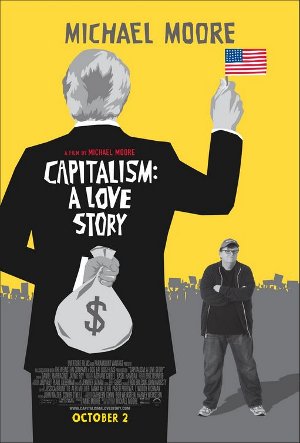- Title: Capitalism: A Love Story
- IMDB: link

 In the past, Michael Moore has taken on George Bush, the gun lobby, and health care. In his latest film Capitalism: A Love Story, he finds a new target in the economic system of capitalism. Greed, it turns out, isn’t really good afterall. As in his previous movies, Moore combines interviews of real Americans, news footage, the town of Flint, funny clips, his own personal narrative, and his trademark stunts, to try and prove his point. Although Capitalism is a highly entertaining movie, in terms of constructing and presenting an argument it’s Moore’s weakest entry to date.
In the past, Michael Moore has taken on George Bush, the gun lobby, and health care. In his latest film Capitalism: A Love Story, he finds a new target in the economic system of capitalism. Greed, it turns out, isn’t really good afterall. As in his previous movies, Moore combines interviews of real Americans, news footage, the town of Flint, funny clips, his own personal narrative, and his trademark stunts, to try and prove his point. Although Capitalism is a highly entertaining movie, in terms of constructing and presenting an argument it’s Moore’s weakest entry to date.
The basic premise of the film is capitalism is a flawed and inherently destructive system. To help prove his point, Moore showcases the inequality between corporate America and the middle class (which has been taken advantage of by a growing culture of greed). The advantages and opportunities that capitalism fosters such as entrepreneurship, invention, and the ability to rise far above the economic station of your birth, are simply glossed over (or reduced to broad generalization).
The film includes several strong moments including FDR’s proposal for a second Bill of Rights which would have assured all Americans the right to health care, a good job, and affordable housing. From Moore’s perspective, America was instrumental in getting other countries these things, but decided for itself, that a large pile of money was more desirable.
The film also has fun with Reagan’s presidency (which provides the funniest moment of the film) and the rise of corruption of the 1980s, which we are still paying for today. The film showcases how corporations use every loophole available to squeeze money from their workers, even after their deaths. The “Dead Peasant” portion of the film will no doubt shock and sicken many who were unaware of the business practice of companies buying life insurance for their employees without their knowledge with the company being the sole beneficiary. Why would they do something like this? Death is profitable.
As the film winds to its end, it becomes a cry for action, any action. As Moore states, the only way greed (which he infers is inherent in a capitalist system) can be held in check is for the people to recognize what is happening and demand a change. To help illustrate this point, Capitalism includes a bread company co-op, striking workers in Pittsburgh, and the grassroots movement which led to the unexpected election of a black President on a campaign of change.
Much like Bill Maher’s Relilgulous (which I also had mixed feelings towards), the film takes on a large concept and posits that isn’t simply broken, but evil. Both films point out numerous flaws, but don’t quite succeed in proving that the instrument of their distaste needs to be wiped from the face of the earth.
As he is wont to do, Moore also ignores the positive aspects of the systems he is attacking or offer constructive alternatives to the status quo. As a film, however, Capitalism is definitely worth seeing, and is quite entertaining. As a political statement trying to decry an entire way of life, it falls a little short.
Our pal Eric at Scene-Stealers enjoyed the film a little more than I did. For a slightly different perspective check out his review here.
